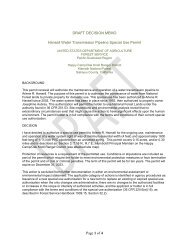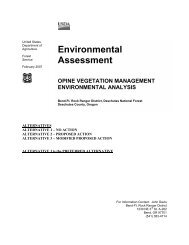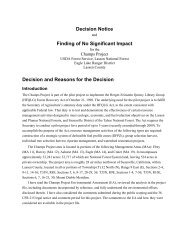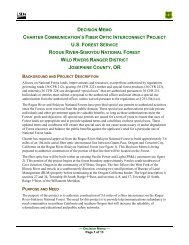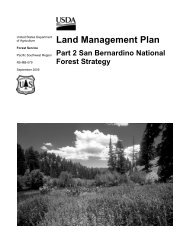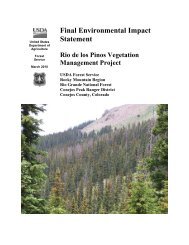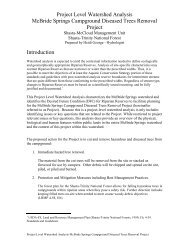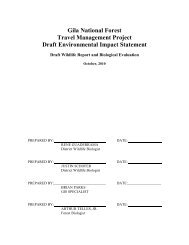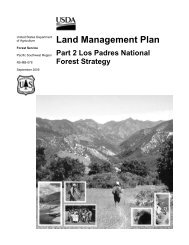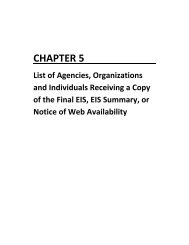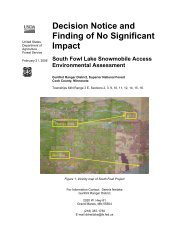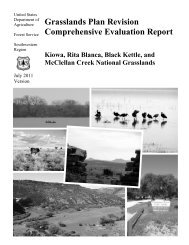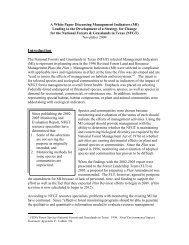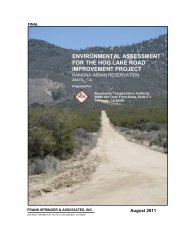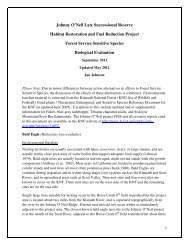- Page 1 and 2:
United States Department of Agricul
- Page 3 and 4:
Environmental Impact Statement for
- Page 5 and 6:
Summary Roca Honda Resources, LLC (
- Page 7 and 8:
• Potential effects on the charac
- Page 9 and 10:
Mine Operation Summary Mine operati
- Page 11 and 12:
Resource Impacts and Mitigation •
- Page 13 and 14:
Resource Impacts and Mitigation num
- Page 15 and 16:
Contents Chapter 1. Purpose of and
- Page 17 and 18:
Contents Table 29. State of New Mex
- Page 19 and 20:
Contents Table 94. Food stamp enrol
- Page 21 and 22:
Contents Figure 66. Aerial image of
- Page 23 and 24:
H1N1 Influenza A virus, subtype H1N
- Page 25:
STD sexually transmitted disease SW
- Page 28 and 29:
Chapter 1. Purpose of and Need for
- Page 30 and 31:
Chapter 1. Purpose of and Need for
- Page 32 and 33:
Chapter 1. Purpose of and Need for
- Page 34 and 35:
Chapter 1. Purpose of and Need for
- Page 36 and 37:
Chapter 1. Purpose of and Need for
- Page 38 and 39:
Chapter 1. Purpose of and Need for
- Page 40 and 41:
Chapter 1. Purpose of and Need for
- Page 42 and 43:
Chapter 1. Purpose of and Need for
- Page 44 and 45:
Chapter 1. Purpose of and Need for
- Page 46 and 47:
Chapter 1. Purpose of and Need for
- Page 48 and 49:
Chapter 1. Purpose of and Need for
- Page 50 and 51:
Chapter 1. Purpose of and Need for
- Page 52 and 53:
Chapter 1. Purpose of and Need for
- Page 54 and 55:
Chapter 1. Purpose of and Need for
- Page 56 and 57:
Chapter 2. Alternatives, Including
- Page 58 and 59:
Chapter 2. Alternatives, Including
- Page 60 and 61:
Chapter 2. Alternatives, Including
- Page 62 and 63:
Chapter 2. Alternatives, Including
- Page 64 and 65:
Chapter 2. Alternatives, Including
- Page 66 and 67:
Chapter 2. Alternatives, Including
- Page 68 and 69:
Chapter 2. Alternatives, Including
- Page 70 and 71:
Chapter 2. Alternatives, Including
- Page 72 and 73:
Chapter 2. Alternatives, Including
- Page 74 and 75:
Chapter 2. Alternatives, Including
- Page 76 and 77:
Chapter 2. Alternatives, Including
- Page 78 and 79:
Chapter 2. Alternatives, Including
- Page 81 and 82:
Chapter 2. Alternatives, Including
- Page 83 and 84:
Land Use Chapter 2. Alternatives, I
- Page 85 and 86:
Treated Water Discharge in an Alter
- Page 87 and 88:
Chapter 2. Alternatives, Including
- Page 89 and 90:
Table 3. Impact comparison matrix T
- Page 91 and 92:
Topic Alternative 1 - No Action Res
- Page 93 and 94:
Vegetation Topic Alternative 1 - No
- Page 95 and 96:
Topic Alternative 1 - No Action Sen
- Page 97 and 98:
Topic Alternative 1 - No Action Rec
- Page 99 and 100:
Topic Alternative 1 - No Action Cul
- Page 101 and 102:
Transportation Topic Alternative 1
- Page 103 and 104:
Topic Alternative 1 - No Action Hum
- Page 105 and 106:
Topic Alternative 1 - No Action Alt
- Page 107 and 108:
Topic Alternative 1 - No Action Leg
- Page 109 and 110:
Other Actions and Projects Consider
- Page 111 and 112:
Chapter 2. Alternatives, Including
- Page 113 and 114:
Marquez Canyon Exploration Current
- Page 115:
Chapter 2. Alternatives, Including
- Page 118 and 119:
Chapter 3. Affected Environment and
- Page 120 and 121:
Chapter 3. Affected Environment and
- Page 122 and 123:
Chapter 3. Affected Environment and
- Page 124 and 125:
Chapter 3. Affected Environment and
- Page 126 and 127:
Chapter 3. Affected Environment and
- Page 129 and 130:
Chapter 3. Affected Environment and
- Page 131 and 132:
Chapter 3. Affected Environment and
- Page 133 and 134:
Chapter 3. Affected Environment and
- Page 135 and 136:
Chapter 3. Affected Environment and
- Page 137 and 138:
Chapter 3. Affected Environment and
- Page 139 and 140:
Chapter 3. Affected Environment and
- Page 141:
Figure 33. Permit area watershed an
- Page 144 and 145:
Chapter 3. Affected Environment and
- Page 146 and 147:
Chapter 3. Affected Environment and
- Page 148 and 149:
Chapter 3. Affected Environment and
- Page 150 and 151:
Chapter 3. Affected Environment and
- Page 152 and 153:
Chapter 3. Affected Environment and
- Page 154 and 155:
Chapter 3. Affected Environment and
- Page 156 and 157:
Chapter 3. Affected Environment and
- Page 158 and 159:
Chapter 3. Affected Environment and
- Page 160 and 161:
Chapter 3. Affected Environment and
- Page 162 and 163:
Chapter 3. Affected Environment and
- Page 164 and 165:
Chapter 3. Affected Environment and
- Page 166 and 167:
Chapter 3. Affected Environment and
- Page 169 and 170:
Chapter 3. Affected Environment and
- Page 171 and 172:
Chapter 3. Affected Environment and
- Page 173 and 174:
Environmental Consequences Surface
- Page 175 and 176:
Construction Phase Effects Chapter
- Page 177 and 178:
Chapter 3. Affected Environment and
- Page 179 and 180:
Table 12. Storm water controls for
- Page 181 and 182:
Best Management Practices Chapter 3
- Page 183 and 184:
Effects on Sediment Transport and D
- Page 185 and 186:
Chapter 3. Affected Environment and
- Page 187 and 188:
Chapter 3. Affected Environment and
- Page 189 and 190:
Chapter 3. Affected Environment and
- Page 191 and 192:
Chapter 3. Affected Environment and
- Page 193 and 194:
Chapter 3. Affected Environment and
- Page 195 and 196:
Chapter 3. Affected Environment and
- Page 197 and 198:
Figure 45. Modeled hydrograph for S
- Page 199 and 200:
Figure 47. Modeled hydrograph for C
- Page 201 and 202:
Chapter 3. Affected Environment and
- Page 203 and 204:
Chapter 3. Affected Environment and
- Page 205 and 206:
Chapter 3. Affected Environment and
- Page 207 and 208:
Pollutant and Averaging Time Chapte
- Page 209 and 210:
Chapter 3. Affected Environment and
- Page 211 and 212:
Climate and Greenhouse Gases Chapte
- Page 213 and 214:
Chapter 3. Affected Environment and
- Page 215 and 216:
Regulatory Review Chapter 3. Affect
- Page 217 and 218:
Chapter 3. Affected Environment and
- Page 219 and 220:
Chapter 3. Affected Environment and
- Page 221 and 222:
Radon-222 Emissions Chapter 3. Affe
- Page 223 and 224:
Figure 48. Vegetation communities i
- Page 225 and 226:
Chapter 3. Affected Environment and
- Page 227 and 228:
Chapter 3. Affected Environment and
- Page 229 and 230:
Chapter 3. Affected Environment and
- Page 231 and 232:
State Listed Plant Species Chapter
- Page 233 and 234:
Species Status Habitat and Distribu
- Page 235 and 236:
Chapter 3. Affected Environment and
- Page 237 and 238:
Chapter 3. Affected Environment and
- Page 239 and 240:
Chapter 3. Affected Environment and
- Page 241 and 242:
Common Name (Scientific name) Black
- Page 243 and 244:
Chapter 3. Affected Environment and
- Page 245 and 246:
Common Name (Scientific Name) Gunni
- Page 247 and 248:
Chapter 3. Affected Environment and
- Page 249 and 250:
Chapter 3. Affected Environment and
- Page 251 and 252:
Chapter 3. Affected Environment and
- Page 253 and 254:
Chapter 3. Affected Environment and
- Page 255 and 256:
Table 39. Criteria for rating impac
- Page 257 and 258:
Wildlife Mortality Chapter 3. Affec
- Page 259 and 260:
Chapter 3. Affected Environment and
- Page 261 and 262:
Chapter 3. Affected Environment and
- Page 263 and 264:
Chapter 3. Affected Environment and
- Page 265 and 266:
Chapter 3. Affected Environment and
- Page 267 and 268:
Chapter 3. Affected Environment and
- Page 269 and 270:
Chapter 3. Affected Environment and
- Page 271 and 272:
Chapter 3. Affected Environment and
- Page 273 and 274:
Chapter 3. Affected Environment and
- Page 275 and 276:
Chapter 3. Affected Environment and
- Page 277 and 278:
Table 40. Impact characterization f
- Page 279 and 280:
Chapter 3. Affected Environment and
- Page 281 and 282:
Chapter 3. Affected Environment and
- Page 283 and 284:
Transportation Chapter 3. Affected
- Page 285 and 286:
Figure 57. Nearby recreation sites
- Page 287 and 288:
Table 41. Impact characterization f
- Page 289 and 290:
Chapter 3. Affected Environment and
- Page 291 and 292:
Minority Populations Chapter 3. Aff
- Page 293 and 294:
Figure 58. Distribution of minority
- Page 295 and 296:
Chapter 3. Affected Environment and
- Page 297 and 298:
Chapter 3. Affected Environment and
- Page 299 and 300:
Chapter 3. Affected Environment and
- Page 301 and 302:
Chapter 3. Affected Environment and
- Page 303 and 304:
Chapter 3. Affected Environment and
- Page 305 and 306:
Chapter 3. Affected Environment and
- Page 307 and 308:
High school graduates, percent of p
- Page 309 and 310:
Earnings Chapter 3. Affected Enviro
- Page 311 and 312:
Chapter 3. Affected Environment and
- Page 313 and 314:
Public Finance Chapter 3. Affected
- Page 315 and 316:
providing an estimate of the “rip
- Page 317 and 318:
Tax Revenue Chapter 3. Affected Env
- Page 319 and 320:
Table 61. Household characteristics
- Page 321 and 322:
Chapter 3. Affected Environment and
- Page 323 and 324: Chapter 3. Affected Environment and
- Page 325 and 326: Chapter 3. Affected Environment and
- Page 327 and 328: Chapter 3. Affected Environment and
- Page 329 and 330: Chapter 3. Affected Environment and
- Page 331 and 332: Tribal History Chapter 3. Affected
- Page 333 and 334: Chapter 3. Affected Environment and
- Page 335 and 336: Chapter 3. Affected Environment and
- Page 337 and 338: Chapter 3. Affected Environment and
- Page 339 and 340: Chapter 3. Affected Environment and
- Page 341 and 342: Chapter 3. Affected Environment and
- Page 343 and 344: Chapter 3. Affected Environment and
- Page 345 and 346: Natural Resources Chapter 3. Affect
- Page 347 and 348: Physical APE Chapter 3. Affected En
- Page 349 and 350: Chapter 3. Affected Environment and
- Page 351 and 352: Chapter 3. Affected Environment and
- Page 353 and 354: Agricultural Fields Chapter 3. Affe
- Page 355 and 356: Chapter 3. Affected Environment and
- Page 357 and 358: Chapter 3. Affected Environment and
- Page 359 and 360: Chapter 3. Affected Environment and
- Page 361 and 362: Chapter 3. Affected Environment and
- Page 363 and 364: Chapter 3. Affected Environment and
- Page 365 and 366: • Removal of a property from its
- Page 367 and 368: Chapter 3. Affected Environment and
- Page 369 and 370: Chapter 3. Affected Environment and
- Page 371 and 372: Chapter 3. Affected Environment and
- Page 373: Chapter 3. Affected Environment and
- Page 377 and 378: Chapter 3. Affected Environment and
- Page 379 and 380: Impacts to Natural Resources with C
- Page 381 and 382: Chapter 3. Affected Environment and
- Page 383 and 384: Site No. Project Section Land Statu
- Page 385 and 386: Chapter 3. Affected Environment and
- Page 387 and 388: Visual Resources Affected Environme
- Page 389 and 390: Figure 64. View looking north from
- Page 391 and 392: Chapter 3. Affected Environment and
- Page 393 and 394: Alternative 1 Chapter 3. Affected E
- Page 395 and 396: Chapter 3. Affected Environment and
- Page 397 and 398: Chapter 3. Affected Environment and
- Page 399 and 400: Environmental Consequences Chapter
- Page 401 and 402: Chapter 3. Affected Environment and
- Page 403 and 404: Chapter 3. Affected Environment and
- Page 405 and 406: Chapter 3. Affected Environment and
- Page 407 and 408: Chapter 3. Affected Environment and
- Page 409 and 410: Chapter 3. Affected Environment and
- Page 411 and 412: Chapter 3. Affected Environment and
- Page 413 and 414: Chapter 3. Affected Environment and
- Page 415 and 416: New Mexico 1.11 (0.98 - 1.25) Cibol
- Page 417 and 418: Chapter 3. Affected Environment and
- Page 419 and 420: Chapter 3. Affected Environment and
- Page 421 and 422: Chapter 3. Affected Environment and
- Page 423 and 424: Chapter 3. Affected Environment and
- Page 425 and 426:
Chapter 3. Affected Environment and
- Page 427 and 428:
Chapter 3. Affected Environment and
- Page 429 and 430:
Magnitude Descriptor Precedence or
- Page 431 and 432:
Chapter 3. Affected Environment and
- Page 433 and 434:
Noise Chapter 3. Affected Environme
- Page 435 and 436:
Chapter 3. Affected Environment and
- Page 437 and 438:
Chapter 3. Affected Environment and
- Page 439 and 440:
Chapter 3. Affected Environment and
- Page 441 and 442:
Chapter 3. Affected Environment and
- Page 443 and 444:
Chapter 3. Affected Environment and
- Page 445 and 446:
Chapter 3. Affected Environment and
- Page 447 and 448:
Chapter 3. Affected Environment and
- Page 449 and 450:
Chapter 3. Affected Environment and
- Page 451 and 452:
Chapter 3. Affected Environment and
- Page 453 and 454:
Chapter 3. Affected Environment and
- Page 455 and 456:
Chapter 3. Affected Environment and
- Page 457 and 458:
Chapter 3. Affected Environment and
- Page 459 and 460:
Chapter 3. Affected Environment and
- Page 461 and 462:
Chapter 3. Affected Environment and
- Page 463 and 464:
Chapter 3. Affected Environment and
- Page 465 and 466:
Chapter 3. Affected Environment and
- Page 467 and 468:
Chapter 3. Affected Environment and
- Page 469 and 470:
Chapter 3. Affected Environment and
- Page 471 and 472:
Resource Area Cultural and Historic
- Page 473:
Cumulative Effects Chapter 3. Affec
- Page 476 and 477:
Chapter 4. Consultation and Coordin
- Page 478 and 479:
Chapter 4. Consultation and Coordin
- Page 481 and 482:
Glossary Air-Quality Control Region
- Page 483 and 484:
References Cited (ACHP, 2005). Advi
- Page 485 and 486:
References Cited (Basin Coordinated
- Page 487 and 488:
References Cited (Brugge et al., 20
- Page 489 and 490:
References Cited (Census, 2011). U.
- Page 491 and 492:
References Cited (DesertUSA, 2011).
- Page 493 and 494:
References Cited (Gordon, 1961). Go
- Page 495 and 496:
References Cited (Jackson, 2002). J
- Page 497 and 498:
References Cited (Lyford et al., 19
- Page 499 and 500:
(NatureServe, 2010a). NatureSevere.
- Page 501 and 502:
References Cited (NMDH, 2010c) New
- Page 503 and 504:
References Cited (NRGNHA, 2011). No
- Page 505 and 506:
References Cited (RHR, 2011a). Roca
- Page 507 and 508:
References Cited (Stacier and Guzy,
- Page 509 and 510:
References Cited (USEPA, 1975). U.S
- Page 511 and 512:
References Cited (USFS, 2001). U.S.
- Page 513 and 514:
References Cited (USFWS, no date).
- Page 515:
References Cited (WildEarth Guardia
- Page 518 and 519:
Index E economic impacts - 15, 73,
- Page 520 and 521:
Index N National Environmental Poli
- Page 522:
Index W waste - 18, 40, 46, 56-57,



